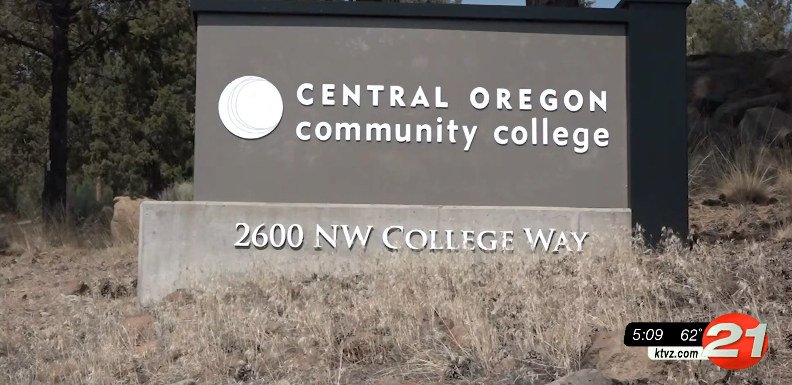COCC informs staff of COVID-19 vaccination requirement, planned March 18 deadline

BEND, Ore. (KTVZ) -- Central Oregon Community College expects to require that employees are vaccinated against COVID-19 by the end of Winter Term on March 18, President Dr. Laurie Chesley informed staff by email on Tuesday.
Here's her vaccine update, in full:
"Dear Colleagues,
"I appreciate your patience as you awaited news on our vaccination subcommittee’s updated policy recommendations and my subsequent decision. I also want to extend my gratitude to the members of COCC’s COVID-19 vaccination subcommittee for their thoughtful, thorough approach to their renewed charge.
"In early November, the subcommittee shared with me their updated recommendations, the full text of which is attached. I have spent the last several weeks discussing these recommendations with SLT, fellow Oregon community college leaders, and higher education legal experts. The COVID-19 landscape continues to shift around us, and I understand the import and the impact such decisions carry for the College’s employees and students, which is why I wanted to be diligent in my considerations.
"I am both appreciative and in strong support of the subcommittee’s recommendations. I also agree in principle to the over-arching recommendations made—as always, details of implementation will be challenging and take time to adequately address. For COCC students, there will be no change to our current student vaccination requirements<https://www.cocc.edu/news/covid19-vaccination-information.aspx>. For COCC employees, we will begin work to implement a vaccination requirement for all COCC employees, including full-time, part-time, adjunct, ABS faculty, classified staff, administrators, as well as all irregular wage and work-study employees. More on this below.
"Shortly after the subcommittee submitted their updated recommendations to me, the Biden administration announced details for the federal mandate requiring employers with 100 or more employees to ensure each of their workers is fully vaccinated or tests for COVID-19 on at least a weekly basis. That mandate has temporarily been delayed in the courts, but there is a very strong possibility that it will be implemented in Oregon, and we know that the state of Oregon’s Occupational Safety and Health Administration (OSHA) is prepared to determine how the mandate will be enacted in our state. The College’s own legal counsel has advised that we also prepare as if this employee mandate will become a reality—perhaps with very little notice from OSHA and a short, state-required implementation timeline.
"If the College is able to determine its own implementation timeline, COCC’s goal will be to have all employees fully vaccinated by the end of Winter Term on Friday, March 18, 2022. I caution again that federal and state OSHA requirements might compel us to move more quickly, and I’ll communicate with you if that occurs. “Fully vaccinated,” per CDC guidance, is defined as 2 weeks after their second dose of the Pfizer-BioNTech or Moderna COVID-19 vaccines, or 2 weeks after the single-dose Johnson & Johnson's Janssen COVID-19 vaccine.
"You may note that the subcommittee’s recommendation did not include irregular wage or work-study employees; however, the federal OSHA employer mandate — if put into effect — does include these groups, and so I am preemptively including them among those College employees required to get vaccinated against COVID-19.
"So please get fully vaccinated as soon as possible. I also strongly encourage all COCC employees to get their COVID-19 booster shot 6 months after their second dose of Pfizer or Moderna, and 2 months after their first dose of Johnson and Johnson. Through December, Deschutes County is offering a free daily drive-thru vaccination clinic<https://www.deschutes.org/health/page/covid-19-vaccine> at the Deschutes County Fairgrounds 12 p.m. – 7 p.m. for first, second, and booster doses. That same link shares additional free vaccination clinics across Central Oregon.
As noted previously, details of implementation will be challenging, and in order to ensure the effectiveness and efficiency of said implementation, I have asked for legal guidance and recommendations for our College regarding those details. Therefore, I cannot include specific details at this time, other than the planned March 18, 2022 deadline for employees to get vaccinated.
We will meet with our employee association leadership and create HR trainings about this requirement. We also will send out a voluntary survey of employees’ vaccination status to better determine the scope of the work ahead.
Employees will continue to be updated on implementation via Headlines. The SLT and I will also review the College’s COVID-19 vaccination policies as needed, and/or as changes to state and national laws warrant. Any review will include broad stakeholder input.
Thanks to extensive scientific data over the many months of the pandemic, we know that COVID-19 vaccines are effective at helping protect against severe disease and death<https://www.cdc.gov/coronavirus/2019-ncov/vaccines/effectiveness/work.html> from the virus that causes COVID-19, including known variants<https://www.cdc.gov/coronavirus/2019-ncov/variants/variant.html> currently circulating. The available vaccines are extremely safe<https://www.cdc.gov/coronavirus/2019-ncov/vaccines/keythingstoknow.html?s_cid=10493:cdc%20covid%20vaccine:sem.ga:p:RG:GM:gen:PTN:FY21>, and they remain our most effective tool in reducing the strain on our health care system and ending the pandemic. Vaccines are now approved and available for everyone ages 5 and up. During the Winter term, COCC will offer education sessions on the COVID-19 vaccines to help our employees seek out answers to any remaining questions they might have. We will center education and factual information sharing in our approach to this employee vaccination requirement.
Please don’t hesitate to connect with your supervisor, SLT member, and/or MyHR@cocc.edu if you have questions.
To co-chairs Sharla Andresen and Julie Downing, to Seana Barry, Erika Carman, Andrew Davis, Teresa DeSitter, Jenn Kovitz, and Shannon Waller, and to Emma Chaput for her previous service: on behalf of the College and all we serve, let me restate my thanks for your hard work in revisiting and revising your recommendations. And as always, thank you, Bobcats, for all you continue to do to keep yourselves, one another, and our communities safe.
Kind regards,
Laurie